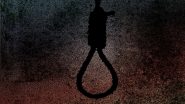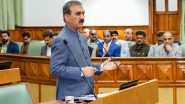London, Dec 20 (AP) Britain's main nurses' union warned Monday that exhaustion and surging coronavirus cases among medical staff are pushing them to the breaking point, adding to pressure on the government for new restrictions to curb record numbers of infections driven by the omicron variant.
The warning throws into stark relief the unpalatable choice Prime Minister Boris Johnson faces: wreck holiday plans for millions for a second year running, or face a potential tidal wave of cases and disruption.
Also Read | Maryam Nawaz Can Be A Model, Camera Loves Her, Says Junaid Safdar's Wedding Photographer Irfan Ahson.
Many governments in Europe and the US are confronting similar dilemmas over how hard to come down in the face of omicron, which appears more transmissible than the previous delta variant that itself led to surges in many parts of the world. Early evidence suggests omicron may also produce less serious illness — though scientists caution it is too soon to say — and that it could better evade vaccine protection.
Even if it is milder, the new variant could still overwhelm health systems because of the sheer number of infections. Confirmed coronavirus cases in the UK have surged by 50% in a week as omicron overtook delta as the dominant variant.
Also Read | UK Reports 12 Deaths Due to Omicron Variant of COVID-19, 104 People Hospitalised.
Patricia Marquis, England director for the Royal College of Nursing union, said the situation over the next few weeks looks “very bleak,” as growing absences from sickness and self-isolation hit hospitals already struggling to clear a backlog of postponed procedures and treat normal winter sicknesses alongside coronavirus cases.
The British Medical Association has warned that almost 50,000 doctors, nurses and other National Health Service staff in England could be off sick with COVID-19 by Christmas Day unless additional restrictions are introduced.
But many political leaders are reluctant to impose the stiff measures they resorted to earlier in the pandemic — often because they promised their people that vaccines would offer a way out of such restrictions and it may be politically untenable to impose them again.
In the US, the prospect of a winter chilled by a wave of coronavirus infections is a severe reversal from the optimism projected by President Joe Biden some 10 months ago, when he suggested that the country would essentially be back to normal by Christmas. France is desperately trying to avoid a new lockdown that would hurt the economy and cloud President Emmanuel Macron's expected re-election campaign.
US vaccine maker Moderna said Monday that a lab tests suggested that a booster dose of its vaccine should offer protection against omicron. Pfizer's testing also found a booster triggered a big jump in omicron-fighting antibodies.
But many scientists say boosters along are not enough and tougher action is needed.
Other countries are warily watching the UK, which on Sunday reported 82,886 more lab-confirmed COVID-19 cases in a day, close to the record high set last week.
The Dutch government began a tough nationwide lockdown on Sunday to rein in sharply rising infections. The World Economic Forum, meanwhile, announced Monday it is again delaying its annual meeting of world leaders, business executives and other elites in Davos, Switzerland, because of omicron uncertainty.
But many European leaders have opted for something less.
France and Germany have barred most British travellers from entering, and the government in Paris has also banned public concerts and fireworks displays at New Year's celebrations. Ireland imposed an 8 pm curfew on pubs and bars and limited attendance at indoor and outdoor events.
Portugal is telling most nonessential workers to work from home for a week in January, while Greece will have 10,000 police officers on duty over the holidays to carry out COVID pass checks.
In Spain, the national average of new cases is double what it was a year ago. But authorities in the country with one of Europe's highest vaccination rates are betting primarily on mandatory mask-wearing indoors and the rollout of booster shots, with no further restrictions in the pipeline.
Miguel Hernan, an epidemiologist at Harvard University who advised the Spanish government earlier in the pandemic, said the reluctance to impose new curbs was understandable, but warned it was better to act early rather than late.
“The earlier they are applied, the shorter the time they are needed,” he said.
German Health Minister Karl Lauterbach said Sunday that there won't be a lockdown before Christmas but cautioned: “We will have a fifth wave."
Hendrik Wuest, governor of North Rhine-Westphalia, Germany's most populous state, said more restrictions could be on the horizon shortly after Christmas.
“I don't think big New Year parties can happen this year — unfortunately, again,” he added. “Omicron won't forgive us any carelessness if we aren't cautious.” (AP)
(This is an unedited and auto-generated story from Syndicated News feed, LatestLY Staff may not have modified or edited the content body)













 Quickly
Quickly

















